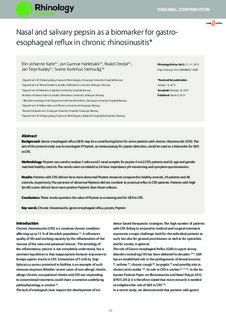Nasal and salivary pepsin as a biomarker for gastro-esophageal reflux in chronic rhinosinusitis
Katle, Elin-Johanne; Hatlebakk, Jan Gunnar; Omdal, Roald; Kvaløy, Jan Terje; Steinsvåg, Sverre Karmhus
Journal article, Peer reviewed
Published version
Permanent lenke
http://hdl.handle.net/11250/2643580Utgivelsesdato
2019-03Metadata
Vis full innførselSamlinger
Originalversjon
Katle, E.J., Nasal and salivary pepsin as a biomarker for gastro-esophageal reflux in chronic rhinosinusitis. Rhinology Online, 2, 25-31. 10.4193/RHINOL/19.003Sammendrag
Background: Gastro-esophageal reflux (GER) may be a contributing factor for some patients with chronic rhinosinusitis (CRS). The aim of the present study was to investigate if Peptest, an immunoassay for pepsin detection, could be used as a biomarker for GER in CRS.
Methodology: Peptest was used to analyse 3 saliva and 3 nasal samples for pepsin A in 62 CRS-patients and 62 age and gender matched healthy controls. The results were correlated to 24-hour impedance pH-monitoring and symptom questionnaires.
Results: Patients with CRS did not have more abnormal Peptest measures compared to healthy controls, 39 patients and 48 controls, respectively. The presence of abnormal Peptests did not correlate to proximal reflux in CRS-patients. Patients with high GerdQ scores did not have more positive Peptests than those without.
Conclusions: These results question the value of Peptest as screening tool for GER in CRS.

